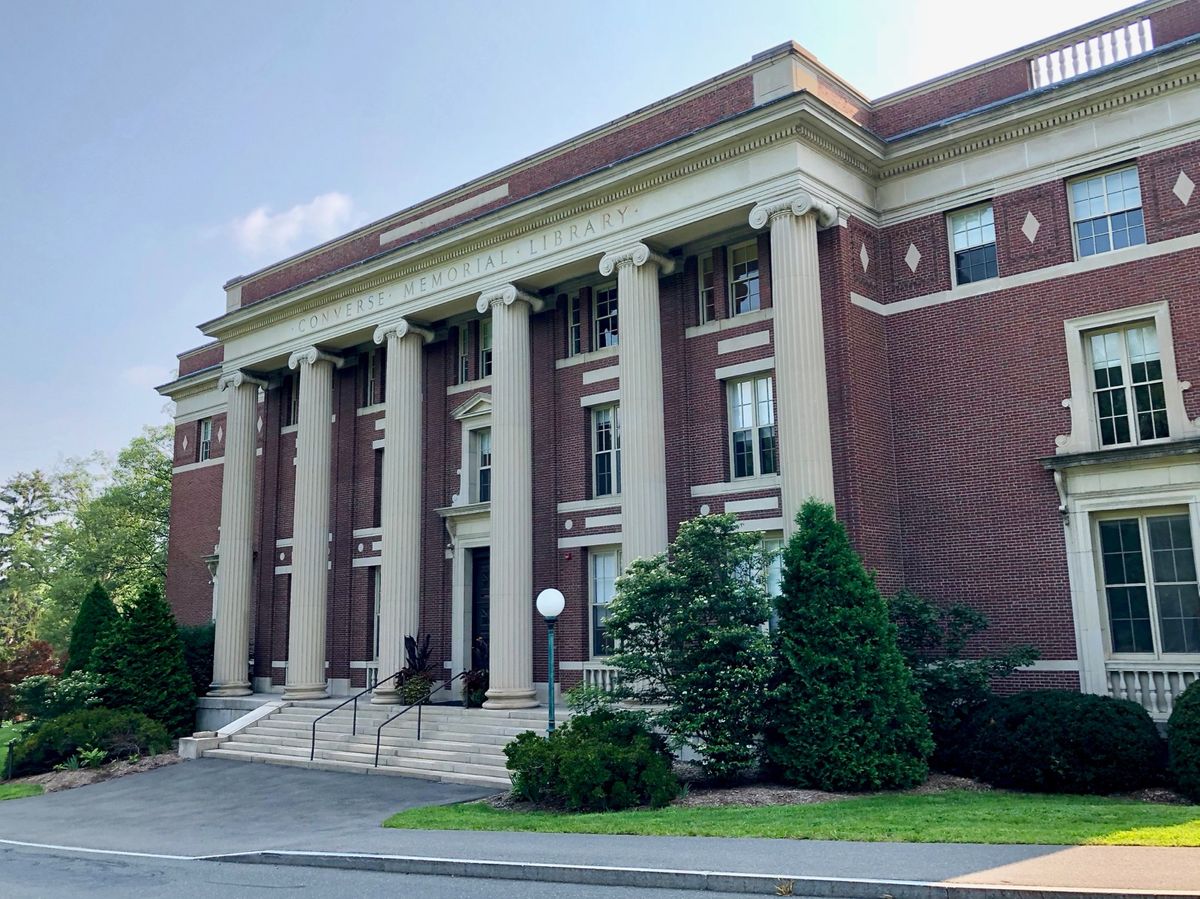Budget Cuts Take Effect Across Campus
Reductions initiated last spring have forced departments across campus to find room in their budgets. Notable changes include scaled-back orientation activities and the end of the college’s contract with Xfinity on Campus.

Fewer speaker events, no more to-go containers in Valentine Dining Hall, the end of Xfinity on Campus. As the new school year begins, almost every corner of the college is dealing with the effects of budget cuts.
The cuts have been planned since last spring, as a response to elevated inflation and a 10 percent decline in the endowment. Most departments and divisions were asked to cut their 2023-2024 non-compensation budgets, which cover the college’s expenses outside of paying staff and faculty and maintaining its debt, by 15 percent. Altogether, non-compensation spending makes up around 17 percent of the college’s expenditures
College leaders have emphasized that non-personnel budgets were targeted for cuts to preserve commitments to faculty and staff, who received 4 percent pay increases, and in order to continue offering generous financial aid packages. Financial aid awards as a percentage of combined tuition costs increased from 45.7 percent in 2022-2023 to 48.2 percent this year. Overall, the fiscal year 2024 budget represents a 4 percent increase over the previous year’s.
In a year in which financial difficulties have forced some colleges and universities to close entire departments, the cuts at Amherst are unlikely to affect the core operations of the college. Nevertheless, the department and division heads who spoke with The Student indicated that the reductions have forced them to seriously scrutinize their budgets and weigh difficult trade-offs.
From scaled-back first-year orientation to discontinued journals at the library, dozens of small changes serve as a reminder that, as President Michael Elliott said last spring, a college community long accustomed to always saying “yes” has had to, at least sometimes, begin to say “no.”
In an email to faculty and staff sent on June 9, Chief Financial and Administrative Officer Mike Thomas pointed to some of the more noticeable changes brought on by the cuts. These include the end of to-go containers and an increase in meal prices for faculty and staff at Val, the “winding down” of the flat-screen information boards in place across campus, the replacement of desk phones across campus with a computer-based calling software, and the elimination of some campus events.
Additionally, Thomas said that the college decided to end its contract with Xfinity on Campus, which provided students with live TV and also gave them access to Max (HBO’s streaming service).
Though departments were initially asked to cut 15 percent of their non-personnel budgets, the cuts did not look entirely uniform across the board, Thomas said.
For example, although the athletics department eventually met the 15 percent target through a combination of cuts and non-endowment gifts, it was initially not asked to cut as much as other departments, according to a college spokesperson.
Thomas said that the biggest expense for athletics is travel. Teams take buses, and occasionally planes, to a slate of away games that are often scheduled more than a year in advance, he said. This meant that by the time the budget process rolled around last spring, teams had in effect already committed to a large chunk of spending that could not be easily rolled back.
Nevertheless, the administration eventually decided to ask athletics to meet the 15 percent target like other department, the spokesperson said.
“Athletics was asked to meet the target through cost reduction, with the use of [athletics-specific] endowment distributions or with non-endowment gifts,” Thomas wrote in a follow-up.
Other departments, like facilities, dining services, and the Office of Student Affairs (OSA), saw cuts of less than 15 percent. Facilities and dining struggle against especially high rates of inflation in food and energy prices, respectively. OSA, due to its proximity to student life, saw a more modest 7 percent reduction.
Overall, the combined non-compensation budget was cut by just 11 percent, Thomas said, after an uptick in the markets later in the spring gave the budget office room to relax the overall 15 percent number.
At the same time, inflation continued to fall, from a high of more than 8 percent annually in July of 2022 to just above 3 percent last month, further lessening the macroeconomic pressures that prompted the budget cuts in the first place.
Nevertheless, Thomas said that because inflation is still elevated, allocations for non-compensation funds in the fiscal year 2024 budget will be the new “baseline” going forward, indicating that the changes made across campus this year will become part of a new, more permanent normal.
During first-year orientation, that new normal entails pared-back LEAP activities. Whereas LEAPs have historically entailed day-long adventures exploring the Pioneer Valley, this year all first-years instead participated in the “Daring Edge” community-building event on the first year quad.
“I remember there was far more variety last year,” said Sam Fetters ’26, who served as an orientation leader this year.
However, Fetters found the new, scaled-back activity in some ways more fulfilling.
“While I personally enjoyed biking last year for LEAP,I think that Daring Edge did a far better job of connecting me both with the first-year class and with my Co-OLs,” he said.
In dorms, successive years of cuts to the Community Advisor (CA) budget will decrease the number of floor events. CAs this year are granted just $20 per resident each semester.
Daniya Ali ’25, a CA in Moore who served in the same role last year, said that the changes would make her more careful when planning events than she has been in the past, but would not stop her from building a community on her floor.
“I think I’ll be a lot more conscious,” she said. “But I think it's still a generous amount, because we're able to actually get a lot if you're smart about how you use your money.”
At the library, the squeeze has forced director Martin Garnar to conduct a review of all its journals and databases it pays for access to. In consultation with faculty, the library will unsubscribe from those that have seen the least traffic in recent years.
Garnar said that a large chunk of the journals and databases had seen views in the single digits, emphasizing that the changes likely will not affect most student and faculty research.
Though conceding that the cuts were difficult, Garnar also said that his past experience at other institutions gave him a bit of perspective.
“Even with the cuts that we've had, we're still well resourced,” he said. “I've come from institutions that were not, and so it was always an annual process for us because we had to do it to be able to make the budget go farther.”
For academic departments, tighter budget scrutiny has forced department chairs to change their approach to speaker events.
David Hanneke, professor of physics and chair of the physics and astronomy department, said that, though his department can no longer afford to bring the speakers together with students over catered lunches.
“In the past, we've ordered lunch, and now we'll be taking the speaker to Val,” he wrote in a message to The Student. “It sounds like an easy swap, but walking to Val and waiting in line will cut 15 minutes out of the hour-long visit, which is an unfortunate loss.”
Reflecting on the decisions made over the past few months, Thomas, the chief financial and administrative officer, suggested that though students may notice changes here and there across campus, financial prudence ultimately benefits everyone.
“Long term, it's a really good thing for us to be looking at how we spend our money,” he said. “Because eventually it ends up impacting the student experience one way or the other.”
Correction, Sept. 13, 2023: This article has been updated to reflect information shared by a spokesperson for the college. The across-the-board pay raise was 4 percent, not 4.9 percent. Also, the increased price of Valentine Dining Hall meals applies to faculty and staff, not just faculty.
Correction, Sept. 21, 2023: This article has been updated to reflect information shared by a spokesperson for the college. Although the athletics department was initially not asked to make as steep cuts as other departments, it eventually was asked to cut 15 percent. It did so through a combination of reducing spending and the deployment of non-endowment gifts.




Comments ()